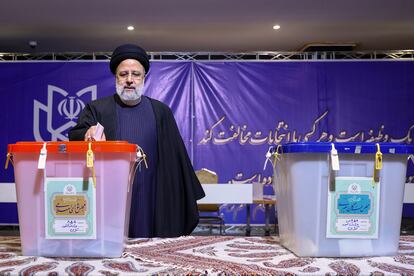Iran sentences author of anthem of Mahsa Amini protests to almost four years in prison
The sentence for musician Shervin Hajipour was announced on the same day the country held elections that served as a test of the regime’s legitimacy

Baraye, the title of a song composed by Shervin Hajipour, means “for” or “because” in Farsi. The lyrics that the 26-year-old musician, one of the most popular in Iran, wrote were inspired by 31 messages that other Iranians had posted on social networks: “For dancing in the streets,” “for every time we were afraid to kiss our lovers,” “for our sisters” and “for women, life and freedom.” These lyrics, which in that last stanza repeat the slogan of the 2022 anti-regime protests sparked by the death in police custody of Mahsa Amini, a young woman arrested for allegedly violating Iran’s mandatory headscarf law, has earned the musician a sentence of three years and eight months in prison. The ruling was announced Friday, on the same day that 61 million Iranians were called to elect their new parliament and the 88 members of the Assembly of Experts, the body in charge of choosing the successor to Iran’s supreme leader, Ali Khamenei, at the polls.
“The defendant has been sentenced to three years in prison for propaganda against the system and another eight months in prison for inciting unrest with the aim of undermining the country’s security,” reads the sentence, which the musician shared on his Instagram account. Hajipour was arrested in October 2022, barely a month after Amini’s death on September 16, and subsequently released on bail. Following his arrest, Iranian authorities forced him to delete the song from his social networks.
Baraye was by then the anthem of demonstrations in which the long-simmering anger — not only of women subjected to draconian legislation, but of other Iranians who took to the streets, often chanting the song — crystallized into demands for the fall of the regime. The unrest lasted five months, but was finally quelled by a crackdown in which at least 500 people died, according to human rights NGOs, 22,000 were arrested and at least eight men were hanged.
The crackdown further alienated the Iranian regime from part of the population. That unease is one of the factors leading Iran’s rulers to fear that many citizens will ignore their insistent appeals to vote. Turnout, which according to different polls could range between less than 30% and 41% of the electorate, is the main challenge of an election in which reformist candidates have been disqualified practically in their entirety.
“Make our friends happy and disappoint our enemies. Please vote,” Khamenei declared on Friday as he symbolically opened the election day by casting his ballot. Some 60,000 polling stations opened their doors at 8 a.m. They were to remain open until 6 p.m. but, later in the day, the authorities announced that this deadline would be extended for a few more hours, a measure that seems to be aimed at favoring the objective of increasing the turnout, which, if it collapses, would present a serious crisis of legitimacy.
Only about 30 of the 15,200 candidates — 1,713 of whom are women — from which Iranians can elect the 290 seats in parliament can be considered moderate or reformist. The regime’s hardliners also dominate the list of 144 candidates for one of the seats in the Assembly of Experts. These lists, with hardly any opponents, augur the perpetuation of the status quo. The outgoing parliament in Iran was dominated by a conservative majority of 232 out of 290 representatives.
The Reform Front, which groups some 20 progressive organizations, decided not to contest the elections, which it defines as “not free.” Teachers, students, politicians, and activists, such as the 2023 Nobel Peace Prize winner Narges Mohammadi, have also called for a boycott.
Sign up for our weekly newsletter to get more English-language news coverage from EL PAÍS USA Edition
Tu suscripción se está usando en otro dispositivo
¿Quieres añadir otro usuario a tu suscripción?
Si continúas leyendo en este dispositivo, no se podrá leer en el otro.
FlechaTu suscripción se está usando en otro dispositivo y solo puedes acceder a EL PAÍS desde un dispositivo a la vez.
Si quieres compartir tu cuenta, cambia tu suscripción a la modalidad Premium, así podrás añadir otro usuario. Cada uno accederá con su propia cuenta de email, lo que os permitirá personalizar vuestra experiencia en EL PAÍS.
¿Tienes una suscripción de empresa? Accede aquí para contratar más cuentas.
En el caso de no saber quién está usando tu cuenta, te recomendamos cambiar tu contraseña aquí.
Si decides continuar compartiendo tu cuenta, este mensaje se mostrará en tu dispositivo y en el de la otra persona que está usando tu cuenta de forma indefinida, afectando a tu experiencia de lectura. Puedes consultar aquí los términos y condiciones de la suscripción digital.








































